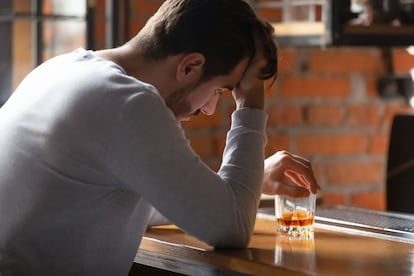Why it is better not to drink if you have emotional problems
It is common to soothe distress with alcohol consumption, but it can be a gateway to abuse that has enormously negative consequences. It is a preventable risk factor in suicide, violence, traffic accidents and clearly worsening physical and mental health

I get it. You’re going through a rough patch, something has happened that you never imagined—at work, with your partner, another disappointment to add to the list—and you feel a pang in your chest that won’t go away; it is probably anger, helplessness or despair. You don’t particularly like to talk about emotions and you hate to feel or look vulnerable, so having a drink seems natural: at first you feel some relief because alcohol is an anxiolytic and activates the reward circuit, then you get a little dazed and stop worrying so much, finally you are uninhibited, overcoming the shyness that has kept you from so much in your life. Drinking, you share socially accepted codes of behavior, and you always have a complicit colleague who eggs you on: “Just have another one, man!” However, without puritanism or dogmas, we can analyze the studies undogmatically, without being puritanical, to calmly consider whether or not drinking alcohol is the best option when you have psychological problems.
Alcohol reduces the ability to think, re-evaluate a situation and seek effective ways of coping with stress. It serves as a smokescreen that hinders communication between people in close proximity and often makes a situation worse: it sometimes makes it easier for a bad patch to become a disastrous one. The harmful consumption of alcohol lowers work performance and worsens family life and physical health. I have seen homeless, evicted, sick and addicted to the Tetra Brik of wine who have told me: “I was normal, but this all started when I was fired from my job and I started drinking...”. In addition to its avoidant nature (“drinking to forget and not think”), alcohol produces cognitive impairment, even in small quantities. The effect of a binge is detectable up to five days later in some tests. One may think he or she drinks “normally,” but over time it is easy to slide into abuse or dependence. “That I’m in control!” the alcoholic often exclaims. Two-thirds of alcoholics started drinking before the age of 25, in a normalized way, almost without realizing it. Up to 15% of the Spanish population develops a binge drinking pattern, drinking five or more alcoholic drinks in a 2-hour period. The signs of risk are craving the first drink and then not being able to stop. Another sign is needing more and more to achieve the same effect or making repeated attempts to quit (muttering to yourself in the middle of a hangover: “I’m not going out again”). It is for 40% of fatal traffic accidents. When you drink, you minimize the risks even though your ability to cope with them is reduced. Drunken hilarity turns very sensible people into reckless people who later regret what has happened.
After the mirage of the initial euphoria, alcohol depresses. There is overwhelming evidence of an association between alcohol and depression; it is responsible for 15% of completed suicides. Mental disinhibition is conducive to catastrophic ideas, death and suicide. Drunkenness with firearms is a major public health problem in the United States. In Europe, reducing its harmful use is included in sensible, evidence-based suicide prevention plans. We know that the effect of alcohol has its idiosyncrasies and there are genetically vulnerable people: if your father, mother or grandparents had alcoholism, you probably shouldn’t even smell it.
An important issue: Alcohol abuse is strongly associated with violent behavior, through disinhibition of behavior, a greater susceptibility to provocation (those terrible fights in clubs between macho men “for looking at my girlfriend”) and a misinterpretation of sexual intentions. Alcohol acts explosively on the abuser and the victim, and then we have to manage the psychological and legal consequences of the trauma. Some perpetrators adduce the excuse of “being drunk,” as if that gave them a free pass and their behavior had no consequences. This is a relevant factor in the pressing issue of prevention of male violence.
Although it is not widely known, alcohol consumption in pregnancy is the leading preventable cause of intellectual disability. Between 20% and 30% of pregnant women drink, and fetal alcohol syndrome, which occurs in 20 out of every 1,000 births, is associated with low IQ, facial abnormalities, short stature, ADHD and behavioral problems. Simply not drinking and smoking during pregnancy would have a huge preventive effect. In adolescence we clearly see the damage alcohol does on the brain and how it literally reduces the volume of its gray matter. In epidemiological studies in Sweden, having been hospitalized for alcohol intoxication in adolescence was the most robust predictor of later developing dementia. Alcohol abuse reduces academic performance and in adults produces a picture equivalent to Alzheimer’s disease (alcoholic dementia) and, sometimes, Korsakoff’s syndrome, in which the patient forgets what is happening and fills it with fantasies. Psychiatrists see hallucinations and delusions caused by alcohol dependence. Through what we call dual pathology (two mental illnesses at the same time, which tragically feed into each other), alcohol worsens the prognosis of most mental disorders. I haven’t even mentioned alcohol’s effects on the liver, the pancreas, the heart or its association with strokes and cancer.
I think that there are too many negative effects, and the gateway to this harmful alcohol consumption is distress, suffering, an incessant pang. This health data confronts a deep-seated alcoholic culture, a powerful industry and a romantic view of its consumption. We’ve been entertained by the alcoholic gatherings of Spanish poets in the 1970s and thought we saw the ideal of freedom in the addictions of Scott Fitzgerald and Malcolm Lowry (“our ideal life contains a tavern”). In a country that was not politically unhinged, public health measures to reduce the harmful consumption of alcohol and its terrible consequences could be considered, without it meaning being a hooligan or detractor of one political party or another.
Sign up for our weekly newsletter to get more English-language news coverage from EL PAÍS USA Edition
Tu suscripción se está usando en otro dispositivo
¿Quieres añadir otro usuario a tu suscripción?
Si continúas leyendo en este dispositivo, no se podrá leer en el otro.
FlechaTu suscripción se está usando en otro dispositivo y solo puedes acceder a EL PAÍS desde un dispositivo a la vez.
Si quieres compartir tu cuenta, cambia tu suscripción a la modalidad Premium, así podrás añadir otro usuario. Cada uno accederá con su propia cuenta de email, lo que os permitirá personalizar vuestra experiencia en EL PAÍS.
¿Tienes una suscripción de empresa? Accede aquí para contratar más cuentas.
En el caso de no saber quién está usando tu cuenta, te recomendamos cambiar tu contraseña aquí.
Si decides continuar compartiendo tu cuenta, este mensaje se mostrará en tu dispositivo y en el de la otra persona que está usando tu cuenta de forma indefinida, afectando a tu experiencia de lectura. Puedes consultar aquí los términos y condiciones de la suscripción digital.









































